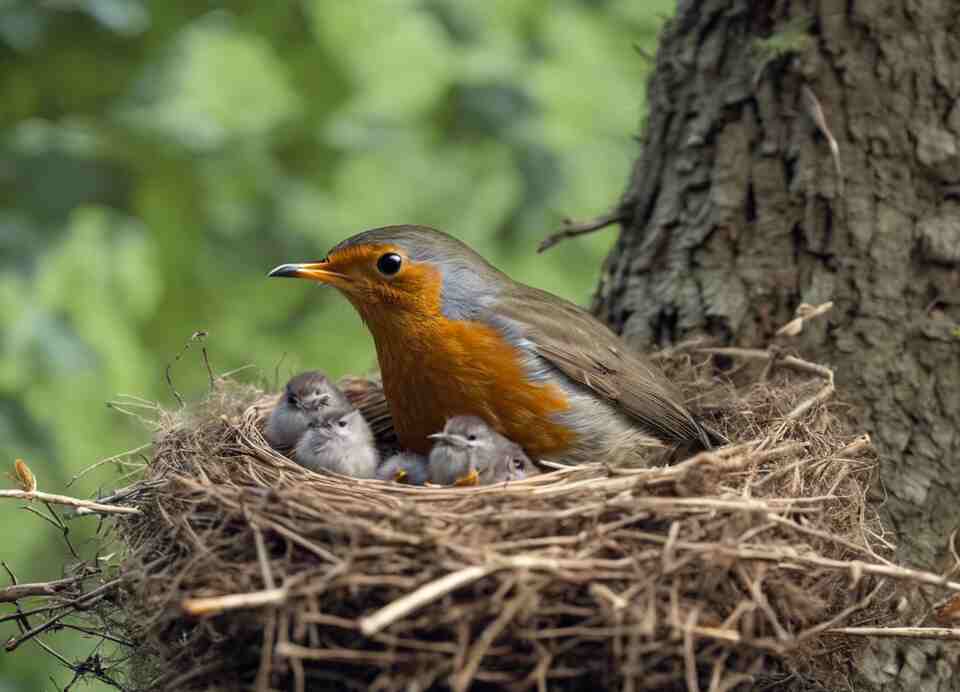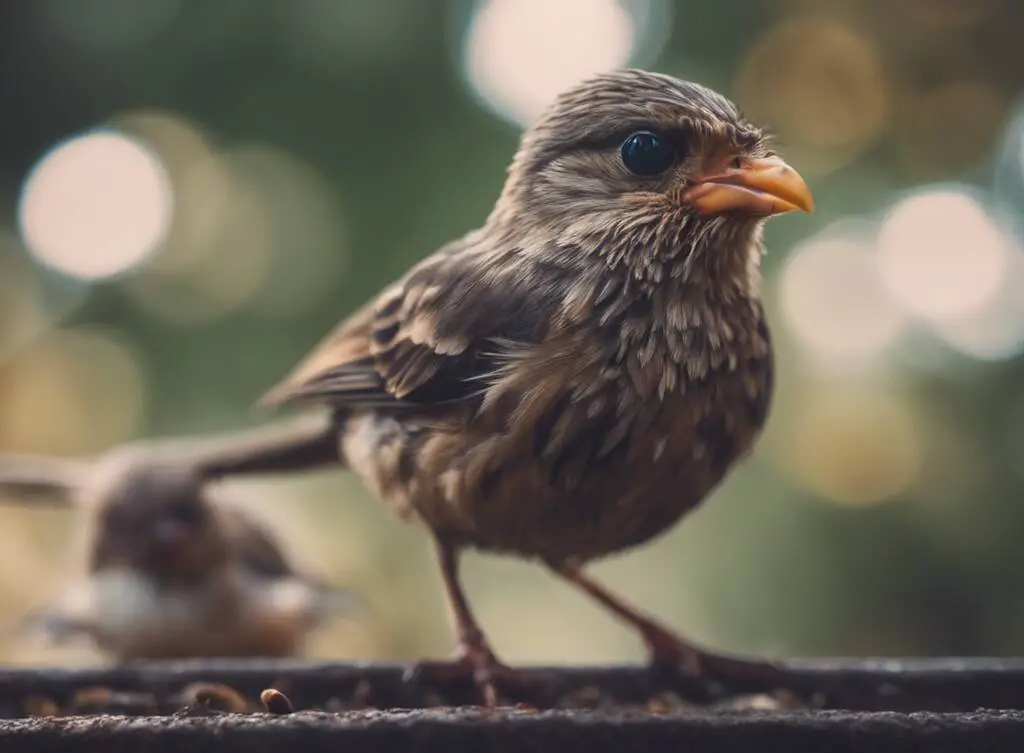As nature enthusiasts, we’ve all witnessed the curious behavior of birds seemingly indulging in their babies’ excrement. This peculiar practice, known as coprophagia, has long intrigued birdwatchers and scientists alike. But what drives these feathered parents to engage in this unconventional behavior? Let’s delve into the fascinating reasons behind this evolutionary adaptation.
Table of Contents
Why Birds Consume Their Offspring’s Feces?
The behavior of birds consuming their offspring’s feces, known as coprophagy, is a fascinating yet perplexing aspect of avian biology. While this behavior may seem peculiar to us, it serves several important purposes in the lives of birds. In this section, we will explore why certain bird species engage in coprophagy and the various reasons behind this intriguing behavior.
Nutrient Recycling
One of the primary reasons birds consume their offspring’s feces is to recycle vital nutrients. Newly hatched chicks are rapidly growing and require a constant supply of essential minerals, vitamins, and proteins to fuel their development. By eating the droppings, parent birds can reabsorb these valuable nutrients, ensuring their young receive the nourishment they need to thrive.
The nestlings’ feces are rich in undigested food, hormones, and other organic compounds that the parents can utilize. This recycling process helps to maximize the efficiency of the birds’ food intake, allowing them to extract every last bit of nutritional value from the resources available.
Sanitation and Cleanliness
In the confined space of a nest, the accumulation of waste can quickly become a hygiene issue. Consuming the chicks’ feces helps to maintain a clean and safe environment, reducing the risk of illness and parasitic infections. By removing the droppings, parents create a more hygienic living space, which is crucial for the delicate health of their offspring.
This sanitation behavior also serves to deter predators, as the presence of feces can attract unwanted attention and make the nest more easily detectable. By keeping the nesting area clean, birds minimize the chances of their young being discovered and targeted by predators.
Protection from Parasites
Ingesting the chicks’ feces may also play a role in protecting the birds from harmful parasites. The digestive system of parent birds is often more equipped to handle certain parasites and pathogens that may be present in the droppings. By consuming the feces, they can eliminate these potential threats before they can harm the vulnerable nestlings.
This strategy helps to safeguard the health of the entire brood, ensuring the chicks are not exposed to dangerous parasites or diseases that could compromise their growth and survival.
Behavioral Adaptation
The practice of coprophagia in birds is not just a practical necessity; it is also a deeply ingrained behavioral adaptation. Over the course of evolution, birds have developed this instinctive behavior to ensure the well-being and successful rearing of their young.
By consuming the chicks’ feces, parent birds are fulfilling a critical role in the delicate balance of the ecosystem. This behavior not only benefits the individual birds but also contributes to the overall ecological balance by maintaining healthy populations and preventing the spread of harmful pathogens.
The seemingly strange behavior of birds eating their offspring’s feces is, in fact, a fascinating adaptation that serves multiple essential purposes. From nutrient recycling and sanitation to parasite protection, this practice plays a vital role in the survival and well-being of avian species.
By understanding the underlying reasons behind this behavior, we can gain a deeper appreciation for the intricate adaptations that have evolved in the natural world. As birdwatchers and nature enthusiasts, observing and learning about these remarkable behaviors can enhance our understanding and foster a greater respect for the incredible feats of our feathered friends.

The Benefits of Eating Hatchling Feces for Birds
Exploring the Nutritional Benefits of Hatchling Feces for Birds
Birds have long been known to exhibit a curious behavior – eating the feces of their own hatchlings. While this practice may seem peculiar to human observers, it actually serves an important purpose in the avian world. In this article, we will delve into the nutritional benefits that make hatchling feces an essential part of a bird’s diet.
The Nutritional Value of Hatchling Feces
Hatchling feces are surprisingly nutrient-dense, providing birds with a concentrated source of essential vitamins, minerals, and other vital compounds. During the early stages of their development, hatchlings are still processing a significant portion of the nutrients they receive from their parents’ food. As a result, their feces contain a higher concentration of these valuable nutrients compared to the droppings of adult birds.
Notably, hatchling feces are rich in proteins, which are crucial for the growth and development of the young birds. These proteins help build and repair tissues, as well as support the immune system. Additionally, hatchling feces contain important minerals such as calcium, phosphorus, and iron, which are essential for strong bones, feather development, and overall health.
The Importance of Hatchling Feces in the Avian Diet
Eating the feces of their own hatchlings serves several important purposes for adult birds. Firstly, it helps to maintain the cleanliness of the nest, reducing the risk of parasites and bacteria that could harm the young birds. By removing the droppings, the adult birds create a more hygienic environment for their offspring to thrive.
Moreover, the consumption of hatchling feces allows adult birds to recycle and reuse the valuable nutrients that have already been partially digested by their young. This recycling process helps to maximize the efficiency of nutrient utilization, ensuring that the adult birds can meet their own nutritional needs while providing their chicks with the best possible care.
Behavioral Adaptations for Consuming Hatchling Feces
Birds have developed specialized behaviors and adaptations to facilitate the consumption of hatchling feces. Many species have been observed carefully removing the fecal sacs from the nest, often using their beaks to gently pick up the droppings and swallow them whole.
Additionally, some birds have been known to actively encourage their hatchlings to defecate in specific locations, making it easier for the adults to access and consume the nutrient-rich feces. This coordinated behavior demonstrates the importance of this practice in the overall health and survival of the avian community.
The consumption of hatchling feces by adult birds is a remarkable adaptation that serves to optimize nutrient utilization and maintain a clean, healthy nest environment. By understanding the nutritional benefits and the behavioral adaptations associated with this practice, we can gain a deeper appreciation for the intricate and fascinating world of avian biology. As we continue to explore and study the complex relationships within the natural world, the insights gained from this behavior can inform our understanding of the sophisticated strategies that birds employ to thrive in their environments.

Conclusion
Birds have evolved a unique behavior that may seem strange to us, but it serves an important purpose in their survival and the well-being of their young. By consuming their hatchlings’ feces, birds are able to obtain valuable nutrients, protect their nests from predators, and ensure the continued health and growth of their offspring.
The practice of eating hatchling poop, also known as coprophagy, is a common occurrence among many bird species. This behavior is driven by the birds’ instinctual need to conserve resources and maximize the efficiency of their food intake. Hatchling feces are rich in undigested proteins, vitamins, and minerals that the parent birds can readily absorb and utilize.
One of the primary benefits of this practice is that it helps to maintain the cleanliness and hygiene of the nest. Hatchling feces can attract predators and parasites, posing a significant threat to the survival of the young birds. By consuming the feces, the parent birds remove this potential source of danger, keeping their nests safe and secure.
Moreover, the nutrients present in the hatchling feces can be crucial for the parent birds’ own well-being. Many bird species, particularly those that are altricial (meaning their young are born helpless and require extensive parental care), have high energy demands during the breeding and nesting seasons. By consuming the nutrient-rich feces, the parent birds can replenish their own energy reserves and maintain their overall health, allowing them to continue providing for their offspring.
Another important benefit of this behavior is that it helps to promote the healthy growth and development of the hatchlings. The undigested nutrients in the feces can provide a supplementary source of nourishment for the young birds, ensuring that they receive all the essential vitamins and minerals they need to thrive. This, in turn, increases the likelihood of the hatchlings’ survival and their eventual successful departure from the nest.
It’s worth noting that the practice of eating hatchling feces is not limited to birds; it is also observed in other animal species, such as rabbits, rodents, and some primates. This widespread occurrence suggests that coprophagy serves an important evolutionary purpose across a variety of animal taxa.
The seemingly strange behavior of birds eating their babies’ poop is actually a crucial adaptation that serves multiple purposes, from maintaining nest hygiene and the parent birds’ health to promoting the growth and development of their young. By understanding the ecological and evolutionary significance of this behavior, we can gain a deeper appreciation for the complex and fascinating world of avian biology.



